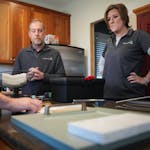Q: I'm interested in gathering information to plan for moving from our home when we can't take care of it. I am 68 and my husband is 79 and in excellent health. But this past winter has caused us to take stock of the future. Can you suggest some resources so we can consider the implications of moving, selling, planning?
A: I would look around your home and ask yourself, how convenient is your home to live in if one of you needed to use a wheelchair or a walker? Can a wheelchair get through doors, especially to the bathroom? Who will clean the gutters, mow the lawn and shovel snow from the sidewalk with the passage of time?
Equally important is taking an audit of community services. For instance, when you're less mobile how will you get to the theater, coffee shop, ice cream parlor and doctors office? Is it practical to rely on public transportation to visit friends? Are shared ride services available? What organizations in your community offer services to the elderly?
Depending on the answers, you could consider investing in some modifications. You might want to tap into "universal design" elements for the home that eases aging-in-place. Examples include replacing doorknobs with handles (easier on arthritic hands) and installing a European shower with no lip (good for wheelchair access). You could consult with professionals like a certified aging-in-place specialist or home remodelers specializing in universal design.
There are several arrangements to research if moving becomes a better option. You don't want age-in-place to become stuck-in-place. Among the alternatives to consider are continuing care communities, which offer the option of starting with independent living in an apartment and, if health deteriorates, the ability to move into assisted living and even memory care units. Assisted living centers are worth researching, too.
Continuing care communities, assisted living centers and similar living arrangements come with contracts that may be difficult to decipher. You'll want to hire a knowledgeable lawyer to explain the trade-offs.
Among resources, the AARP offers much practical information on its website, including its HomeFit Guide. It's website also offers detailed information on continuing care communities. Caring.com is another place for researching potential communities. The National Association of Area Agencies on Aging is a useful starting place to learn about community resources in your area.
Chris Farrell is senior economics contributor, "Marketplace," commentator, Minnesota Public Radio.



